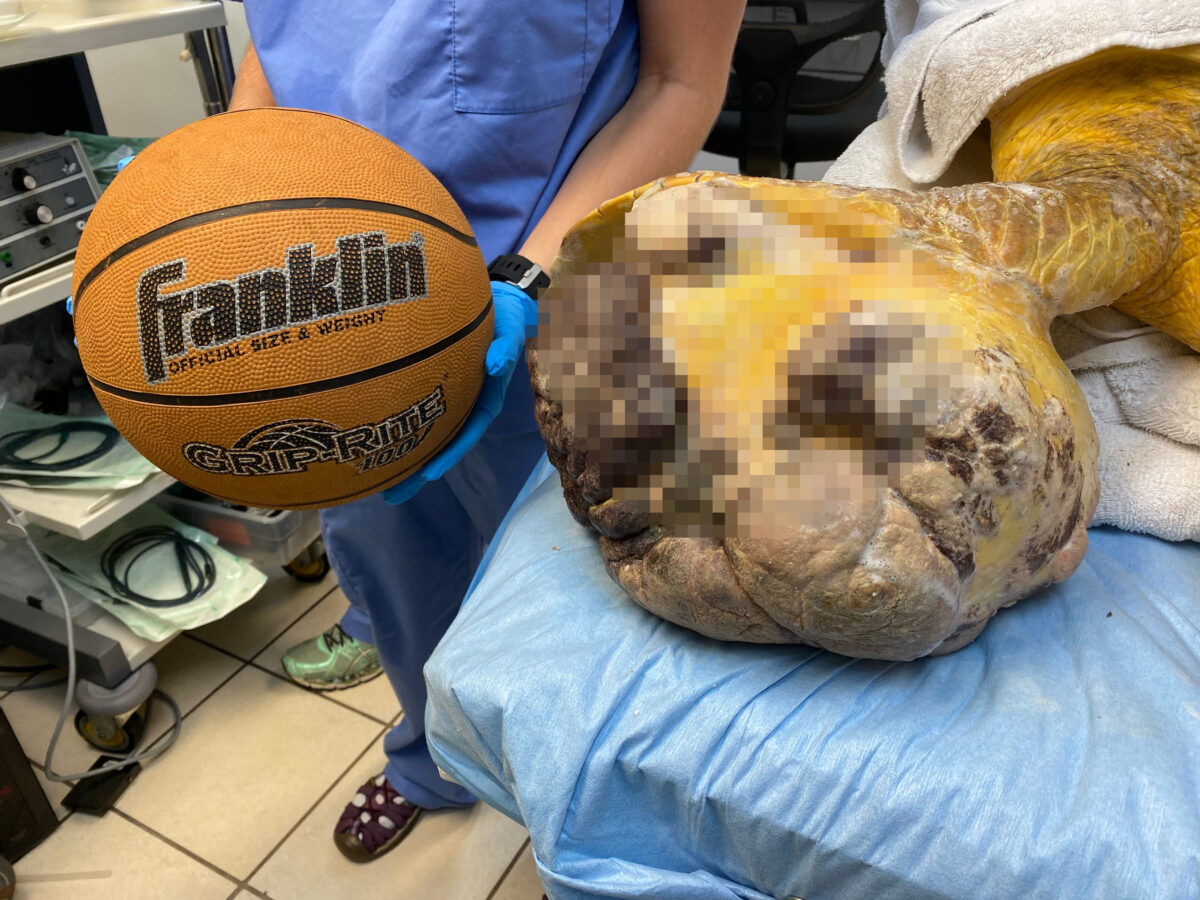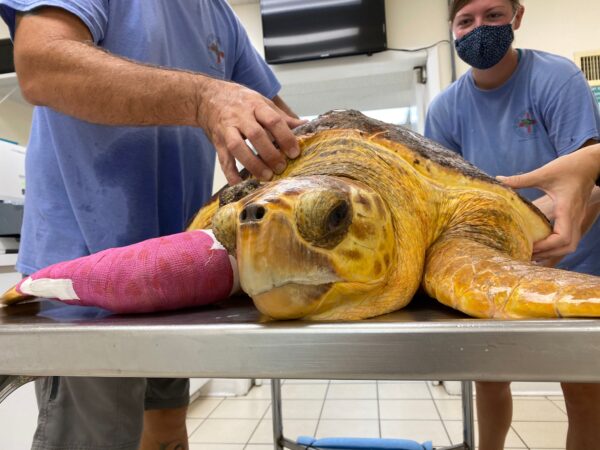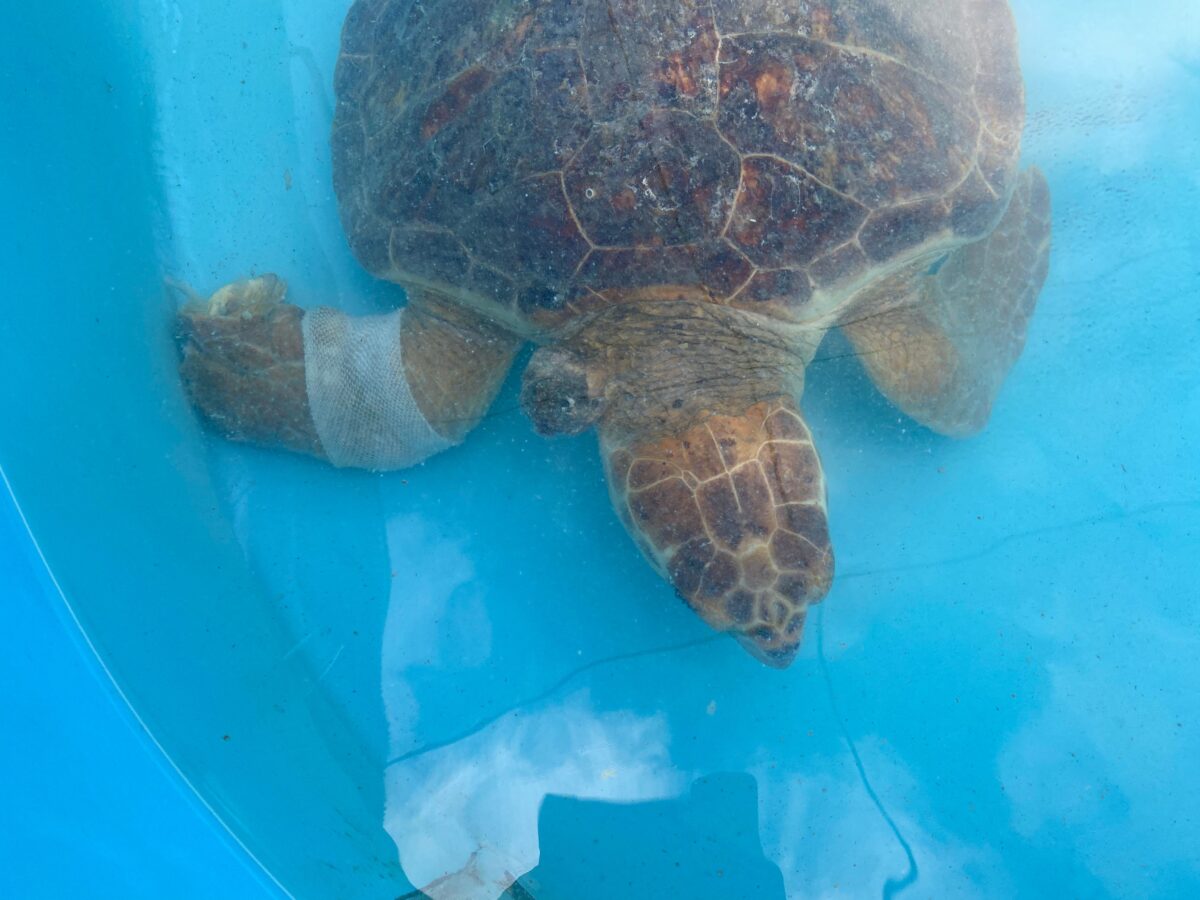WARNING: THIS ARTICLE CONTAINS CONTENT THAT SOME READERS MAY FIND DISTURBING.
A Florida loggerhead sea turtle, nicknamed Chomper, is embarking on a complicated journey to full recovery after surgeons removed a massive tumor, larger than a basketball, from her right front flipper.

The turtle was found by a family while boating off Duck Key in the Florida Keys on Sept. 17. The family noticed Chomper tangled in a fishing net, and, spotting her enormous tumor, lifted her aboard and transported her to the Turtle Hospital in Marathon, reported the Miami Herald.
The sea turtle was named by the family’s two young sons.

(Courtesy of The Turtle Hospital)
On Sept. 19, lead veterinarian Dr. Terry Norton successfully removed the whopping growth from the 150-pound (approx. 68-kilogram) sea turtle. The tumor weighed in at exactly 14.2 pounds (approx. 6 kg).

Hospital manager Bette Zirkelbach commented that tumors, and especially large ones, are rare in loggerhead turtles.
“In 30 years, we’ve never seen a tumor that big,” Zirkelbach said.
A much smaller vascular tumor around the turtle’s neck is scheduled to be removed at a later date.

(Courtesy of The Turtle Hospital)
The Turtle Hospital veterinary team shared on Facebook that they are “cautiously optimistic Chomper will make a full recovery.”
The recovering turtle received a blood transfusion after surgery courtesy of Madea, a loggerhead sea turtle living at the hospital that is not eligible for release.
“Please keep the prayers and healing vibes coming Chomper’s way,” the hospital urged, adding that the turtle still has a long way to go in rehab.

Though the Turtle Hospital staffers have been defaulting to female pronouns, in reality, they don’t yet know whether Chomper is male or female, the Miami Herald reported. Zirkelbach said that the hospital had estimated Chomper’s age to be between 18 and 20 years old.
“We don’t know, and won’t know until Chomper reaches sexual maturity, about 25 years old,” Zirkelbach said. “The males grow a long tail when they reach adulthood.”

(Courtesy of The Turtle Hospital)
Two days after the surgery, the hospital shared encouraging footage of Chomper swimming in a small pool, her right front flipper bandaged in a hot-pink cast. However, it wasn’t long before the turtle’s flipper began to degrade.
The hospital told The Epoch Times on Sept. 26 that they were planning leach treatment on Chomper’s compromised flipper in hope of improving circulation. However, sadly, the experimental treatment was to no avail.
It became clear that the turtle’s appendage, having carried the burden of a 14.2-pound tumor for so long and then endured lengthy surgery, could not be saved. Ten days after Chomper’s original rescue from the Florida Keys, the Turtle Hospital’s Dr. Doug Mader performed an amputation.

(Courtesy of The Turtle Hospital)
On Oct. 1, the hospital shared a clip of the rescued sea turtle bobbing comfortably in her recovery tank after waking from her anesthesia with a blue compression bandage wrapped around her shoulder.
Sea turtles are perfectly able to swim with only one front flipper. On Oct. 1, other members of the Turtle Hospital team released a rehabilitated turtle back into the wild, a male nearly 300-pound (approx. 136-kilogram) green sea turtle that had been rescued from an abandoned anchor line that was cutting off the circulation to one flipper.
“As long as [Chomper] heals well from this surgery, she is eligible for return to the wild,” the hospital staffer behind the camera narrated.
“No doubt she is feeling better without that necrotic flipper … Her prognosis is guarded, but we are most hopeful.”
(Courtesy of The Turtle Hospital)